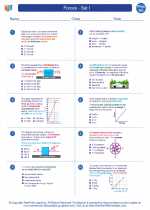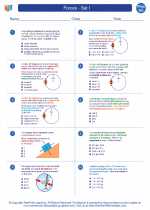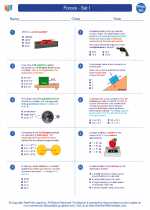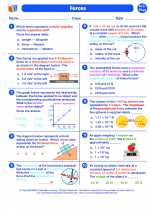Forces - Set I -> classical mechanics
Classical Mechanics
Classical mechanics is the branch of physics that deals with the motion of objects and the forces acting on them. It is a fundamental part of physics and provides the foundation for understanding many other branches of physics, such as thermodynamics, electromagnetism, and quantum mechanics. Here's a study guide to help you understand the key concepts in classical mechanics:
1. Newton's Laws of Motion
- Newton's First Law: An object at rest will remain at rest, and an object in motion will remain in motion at a constant velocity, unless acted upon by a net external force.
- Newton's Second Law: The acceleration of an object is directly proportional to the net force acting on it and inversely proportional to its mass (F = ma).
- Newton's Third Law: For every action, there is an equal and opposite reaction.
2. Kinematics
Kinematics is the study of the motion of objects without considering the forces that cause the motion. Key concepts in kinematics include displacement, velocity, and acceleration.
3. Energy and Work
The concept of energy is central to classical mechanics. Understanding kinetic energy, potential energy, and the work-energy principle is crucial in analyzing the motion of objects under the influence of forces.
4. Momentum and Collisions
Momentum is a fundamental quantity in classical mechanics, and it is conserved in a closed system. Understanding momentum conservation is essential for analyzing collisions and explosions.
5. Circular Motion and Gravitation
Classical mechanics also deals with the motion of objects in circular paths and the force of gravity. Understanding centripetal force and the law of universal gravitation is important in this context.
6. Study Tips
- Understand the fundamental principles of classical mechanics, such as Newton's laws of motion, and their applications to various physical scenarios.
- Practice solving problems involving kinematics, forces, energy, and momentum to develop a strong foundation in the subject.
- Make use of diagrams and visual aids to understand the concepts of motion and forces in classical mechanics.
- Seek out additional resources, such as textbooks, online tutorials, and practice problems, to reinforce your understanding of the subject.
By mastering the principles of classical mechanics, you will develop a strong understanding of the fundamental laws that govern the motion of objects and pave the way for advanced studies in physics.
.◂Physics Worksheets and Study Guides High School. Forces - Set I

 Worksheet/Answer key
Worksheet/Answer key
 Worksheet/Answer key
Worksheet/Answer key
 Worksheet/Answer key
Worksheet/Answer key
